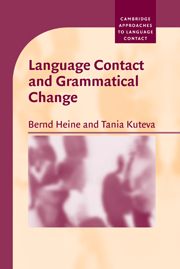Book contents
- Frontmatter
- Contents
- List of maps
- List of tables
- Series editor's foreword
- Preface
- List of abbreviations
- 1 The framework
- 2 On replicating use patterns
- 3 Grammaticalization
- 4 Typological change
- 5 On linguistic areas
- 6 Limits of replication
- 7 Conclusions
- 8 Notes
- References
- Index of authors
- Index of languages
- Index of subjects
6 - Limits of replication
Published online by Cambridge University Press: 13 November 2009
- Frontmatter
- Contents
- List of maps
- List of tables
- Series editor's foreword
- Preface
- List of abbreviations
- 1 The framework
- 2 On replicating use patterns
- 3 Grammaticalization
- 4 Typological change
- 5 On linguistic areas
- 6 Limits of replication
- 7 Conclusions
- 8 Notes
- References
- Index of authors
- Index of languages
- Index of subjects
Summary
Grammatical replication has been described in this book as an essentially uniform process, being shaped by universal processes of grammaticalization. However, this description ignores the fact that this process is constrained by a number of additional factors generally characterizing situations of language contact. In the present chapter we will deal with these factors, and we will adopt a wider perspective with a view to defining the environment in which replication takes place and to pointing out constraints characterizing the process. To this end, we deal in section 6.1 with equivalence – a notion that is widely held to be a major outcome of contact-induced language change, and we will show that this notion is more complex than has hitherto been assumed. In section 6.2 we will discuss a wide range of factors that have been said to constrain or enhance replication, and section 6.3 will be concerned with the question of how the transfer of forms or form–meaning units interacts with replication, and what the role of written discourse is in this process. Another possible limit of grammatical replication is the subject of section 6.4, which is devoted to the question of how replication relates to situations of language obsolescence. Finally, the distinction between internal and external constraints will be looked into in section 6.5, where we will relate contact-related change to language change not affected by language contact.
On equivalence
Equivalence is a central notion in most works on language contact.
- Type
- Chapter
- Information
- Language Contact and Grammatical Change , pp. 219 - 259Publisher: Cambridge University PressPrint publication year: 2005

